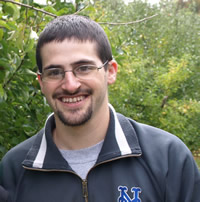SoMAS alumnus Tom Diliberto’s singing skills may remain largely undocumented and undescribed. But, based on his performance at the “America’s Science Idol” competition, held during this year’s annual conference of the American Association for the Advancement of Science, Tom’s science communication skills are unparalleled. At the AAAS session, held in Boston in February, Tom pulled down the top prize for his presentation on the complexities and uncertainties inherent in weather forecasting and the often unreasonable expectations of the public when it comes to accurately predicting the weather.
The “America’s Science Idol” competition was sponsored by the National Science Foundation’s Office of Legislative and Public Affairs, Discover Magazine,Popular Science and the Point of Inquiry Podcast. Patterned a bit after “American Idol”, the fun and engaging workshop was designed to help scientists and engineers communicate with non-technical colleagues and audiences.

Liberto (right) with (L-R); America’s Science Idol host Chris Mooney and judges Indre Viskontas and Corey Powell
A group of scientists was invited to give three-minute talks about their research and why it matters to people outside academia. Afterwards, a panel of media-savvy science communicators from NSF and Discovery magazine critiqued the talks based on three primary criteria: presentation clarity; presentation style & delivery and overall quality. The audience also helped rate the presenters by the volume of their applause. The tone of the event was light-hearted, but with a serious undercurrent: communicating science effectively to the general public and achieving greater science literacy is a national priority.
Tom Di Liberto grew up on Long Island and has been fascinated by the weather since he was a young child. At SoMAS, Tom studied under professor Brian Colle of the Institute for Terrerstrial and Planetary Atmospheres (ITPA) and worked with the School’s Storm Surge Research Group. His thesis dealt with storm surges affecting the New York metropolitan region. After earning his Masters degree in Atmospheric Science/Meteorology in 2009, he joined the Climate Prediction Center of the National Oceanic and Atmospheric Administration (NOAA), where he works as a meteorologist forecasting the weather for Africa, Central America, Hispaniola, and Central Asia with a focus on weather hazards that could affect food security. In addition, Tom conducts research on the use of satellite-derived rainfall estimates in these regions. His research group’s studies took on a whole new level of importance during the past year due to Super Storm Sandy.
In winning, Tom brought home some nice loot, viz.: 1-year subscriptions to Discover and Popular Science; a live guest appearance on the Point of Inquiry podcast and the Discover DVD, as well as a variety of opportunities to visit and link with science communication groups around the country.






You must be logged in to post a comment.